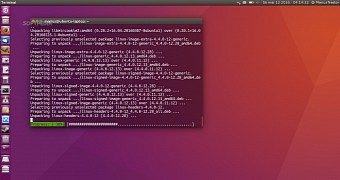Canonical has released on Wednesday a new Linux kernel update for Ubuntu 16.04 LTS (Xenial Xerus) operating system series to address a regression introduced with yesterday's security patch against the Meltdown vulnerability.
On Tuesday, Canonical published multiple security notices to inform users of the Ubuntu 17.10, Ubuntu 16.04 LTS, Ubuntu 14.04 LTS, and Ubuntu 12.04 ESM operating systems that they can now patch their computers against the Meltdown security vulnerability affecting billions of devices.
However, some users running Ubuntu 16.04 LTS immediately reported that their systems failed to boot after installing the new kernel update. There weren't so many reports about this issue, but Canonical confirmed the regression today in a security advisory, and released an updated kernel to address any issues.
"USN-3522-1 fixed a vulnerability in the Linux kernel to address Meltdown (CVE-2017-5754). Unfortunately, that update introduced a regression where a few systems failed to boot successfully. This update fixes the problem. We apologize for the inconvenience," said Canonical in the security advisory.
Updated Xenial HWE kernel available for Ubuntu 14.04 LTS users
As some users are still using the Ubuntu 14.04 LTS (Trusty Tahr) operating system series, Canonical also updated the Xenial HWE (Hardware Enablement) kernel for Ubuntu 14.04.5 LTS systems, addressing the same regression that rendered machines bootless after installing yesterday's patch against Meltdown.
Canonical recommends all users to update their systems immediately. Users using Ubuntu 16.04 LTS (Xenial Xerus) should update their kernels to linux-image 4.4.0.109.114 (generic or lowlatency), and users using Ubuntu 14.04.5 LTS with the Xenial HWE kernel need to update to linux-image 4.4.0-109.132~14.04.1.
If you are in a situation where your computer is no longer bootable because of yesterday's kernel update, you can still access the previously installed kernel images through the GRUB bootloader screen at boot and select a different kernel. Once your machine boots, login, install all available updates and then reboot.

 14 DAY TRIAL //
14 DAY TRIAL //